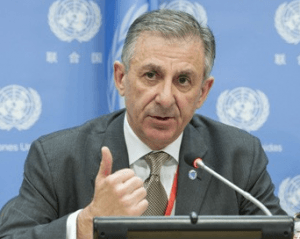New UN report stresses that foreign terrorist fighters constitute significant threat

…and that the international community is lagging behind
Following last week’s Leaders’ Summit hosted by U.S. President Obama, the Security Council just adopted a new report by the Counter-Terrorism Committee and its Executive Directorate (CTED) on foreign terrorist fighters. The report stresses that foreign terrorist fighters constitute a significant and evolving threat.
Terrorist groups such as ISIL act in a quick and adaptable manner. The United Nations and its Member States need to be as rapid and fluid to effectively meet this threat. Over the last year, Member States and a range of other actors have established a number of forceful measures. States have already reinforced border controls and prevented suspected foreign terrorist fighters from travelling. Some have confiscated passports, introduced transit visa requirements, and made better use of INTERPOL screenings for potential foreign terrorist fighters. Private companies are going to great lengths in helping to stem the propaganda and recruitment of foreign fighters; YouTube, for example, have removed 14 million videos over the last two years, and Facebook receive and follow up on one million notifications of user violations per week.
Most States have also developed some capacity to monitor Internet sites and social media to combat online incitement to commit terrorist acts. Some States have also adopted laws that request service providers to retain data so that perpetrators can be identified. But despite all of these measures, Member States and the international community are lagging behind the terrorists. It is still easy for anybody wishing to join a terrorist organization or to travel to a conflict zone to make direct, anonymous contact with a terrorist recruiter. Many Western European States continue to be the origin and transit of foreign terrorist fighters. It is estimated that several thousand European passport holders are currently in Iraq and Syria, and this obviously poses a significant threat to the national security of several countries. So what more is needed?
Currently, only 51 Member States – or approximately one quarter of all members of the United Nations – have so-called advance passenger information (API) systems in place. These are systems that enhance border and aviation security and enable States to detect the arrival or departure of potential foreign terrorist fighters.
Worse is that only half of these States actually use it. International cooperation is not flexible enough, which is why the international community needs to make better use of already existing Security Council resolutions. Adopted under Chapter VII of the UN Charter and therefore binding on all Member States, resolutions 1373 from 2001, 2129 from 2013, and 2178 on foreign terrorist fighters from last year, provide us with the tools we need. With some 30,000 foreign terrorist fighters coming from over 100 countries, terrorism is a global threat, which requires a global response. Attempts to resolve these issues effectively through a purely domestic approach will not work.
Together, we need to urgently step up our efforts and reinforce our preventive capacity across the board – in a flexible and immediate way.
By Jean-Paul Laborde,
United Nations Assistant Secretary-General and Executive Director of the Counter-Terrorism Committee Executive Directorate (CTE)
